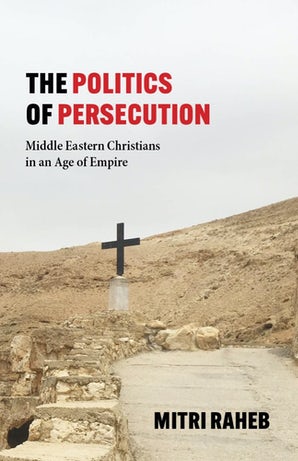Rev. Mitri Raheb’s New Book Rebuffs Western Perceptions of Persecuted Christians in the Middle East, and Retells Their Story
Join Rev. Dr. Raheb for a webinar conversation about this book on Wednesday, February 23, 2022 from 11am-noon Eastern. Register here.
Middle Eastern Christians are not the homogeneous, helpless people that many Western historians would have you believe. In fact, native Palestinian and Christian theologian Dr. Mitri Raheb writes that their most defining characteristic is resilience, not persecution.

The issue of the persecution of Christians in the Middle East has experienced a resurgence of attention since the election of Donald Trump in 2016 and is a focal point of international diplomacy in the region. But while many people claim to speak on behalf of Middle Eastern Christians, few within the international community pause long enough to hear this religious group speak for itself. The Politics of Persecution: Middle Eastern Christians in an Age of Empire represents more than mere retelling of history—it represents the Middle East speaking for the Middle East to a Western audience.
As one might expect, an insider’s take on historical context is critical in grasping the complex geopolitical forces that have placed, displaced, and formed Middle Eastern Christians’ identities over the past two centuries. Raheb, the founder and president of Dar al-Kalima University in Bethlehem, charts Middle Eastern Christian history in accessible and fluid prose, from the invasion of Napoleon Bonaparte in 1799 to the so-called (and relatively recent) Arab Spring.
Raheb’s historical assessment covers:
- European incursions into the Middle East and their effects on society and religion
- The destabilizing and stabilizing effects of war and peace on the region
- Evolving ideologies embraced across the Arab world and their fruits
- The rise of oil, Islamic fundamentalism, regional powers, international interests, and their effects on Middle Eastern Christians
- Key challenges that remain for the region and a recasting of Middle Eastern Christians’ identity
Above all, in an incisive epilogue Raheb offers the Western world gentle correction on the true situation among Middle Eastern Christians: “Christian persecution is a Western construct that says more about the West than about the Christians of the Middle East,” writes Raheb. “It is a perception rather than an actual description, and the politics that underlie it should not be understated.” Raheb concludes the book by observing that the politics surrounding the notion of “Christian persecution” have been leveraged by the West and by the Christian Evangelical Right to advance their own agendas. “Western empires were never really interested in the Middle Eastern Christian but sought a pretext to promote their imperial interests. Over and over again, Middle Eastern Christians were sacrificed on the altar of Western national interests.”
The Politics of Persecution will be of great importance to anyone with an interest in the geopolitical environment of the Middle East and the future of Christians there.
The Rev. Dr. Mitri Raheb is the most widely published Christian theologian in Palestine. He has written or edited more than forty volumes, including Shifting Identities: Changes in the Social, Political, and Religious Structures in the Middle East, Faith in the Face of Empire: The Bible through Palestinian Eyes, and Handbook of Christianity in the Middle East. Raheb is the founder and president of Dar al-Kalima University and the Diyar Consortium in Bethlehem, partners of the Christian Church (Disciples of Christ) and United Church of Christ.
Order from Baylor University Press.
